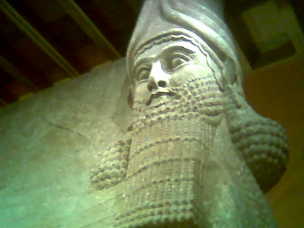Milchama Ve Sharon
(War & Sharon)
Eliyho Matz
If we had writers like Tolstoy, I am sure we would have one of the finest sagas written on the Israeli leader – General Ariel Sharon. But this is not the vast plains of Russia; it is only the land of the ancient Israelis. It is the land of the twelve tribes, the Judges, the prophets, the Kings and prophets of doom, of revivival and more doom. So much doom that it took two thousand years to revive that doomed land and make it what it is today. What it is today we are not really sure yet, but let us focus here on one of the new heros of this land, who now is in a coma at a Jerusalem hospital: Ariel Sharon.
I was born in 1948, the year Israel was still fighting for its survival as the new modern state of the “new Israelis”. Growing up in the 1950’s was no party. Life was tough; food was in short supply; people struggled to survive, my parents among them. And they did survive and they excelled.
Growing up in the 1950’s meant hearing about the war of Independence, the heros, the dead, the sacrifice. Memorials of Yad L’Banim (a hand to the sons) were erected. From the first time I read the newspaper Maariv, my dad brought home, the name Ariel Sharon entered my consciousness. Every time there was a military action of any sort, his name would pop up. First as commander of the notorious 101st Commando Unit. I devoured all the articles and books on this. I was particularly impressed by one of the fallen heros named Irmi and by the greatest Israeli platoon leader Meir Har Zion. Then it was Arik in the Mitle Pass, parachuting into Egyptian territory and founding thereby a military history and of the Red Wings awarded those who parachuted into battle.
But here I must hesitate a minute. Arik Sharon, product as he was of a modern Israeli sovereignty, participated (and almost got killed) in the 1948 War of Independence, then sculpted on that sovereignty a new face and imbued it with vision by creating the 101st Commando Unit. Military analysis is split on the operation of the 101st. True, it boosted Israeli morale, but provided none of the desperately needed peace of mind and security. And then, in 1956, Israel joined England and France in the Sinai war and Sharon created the military fiasco in the Mitle Pass. An independent assessment of Sharon’s military performance up to 1956 would give him high marks for courage but overall judge him too undisciplined to be a top military leader. This in fact was the assessment in the wake of 1956, but never taken seriously, so Sharon remained in the Army, moving upward and onward to the next crisis.
Sharon got another opportunity to prove himself a hero in the War of 1967. He fought in the center of Sinai when he defeated a huge Egyptian army. But his undisciplined personal behavior undermined his accomplishments once again.
From 1948 to 1967 the charismatic Sharon saturated Israeli Army politics Outsiders, onlookers, equating visibility with astuteness, concluded Sharon to be a great military leader. In fact he was far too dangerous and insubordinate to warrant the esteem and, really, even a position of power in any civilian or military organization, most especially the Israeli Army.
I joined the Israeli Army just half a year before the 1967 war, my head filled with tales of heroism, dedication and . . . “Sharonism”. I joined the Paratroopers Unit 202nd, a Sharon creation.
And so it was that, at the ripe old age of almost 19, I shifted at warp speed from bucolic civilian life to military service and was catapulted into the 1967 War. Despite the heroic images I carried with me into the military, I proved to be a less than outstanding soldier. My company commander, recognizing my lack of talent, abandoned me and a few other companion losers at base camp while he lead the cream of Israeli soldiery into battle near Gaza.
No sooner had the 202nd Paratroopers disappeared over the horizon than a commando unit formerly allied with Sharon’s old 101st marched into base camp and pressed my contingent of slackers into service and Israeli Military History. We were lifted airborne in World War II United States Force cast-offs, and flown into Egyptian air space where we lingered for about an hour with nary a shot fired or a trooper deployed, and after deliberations out of our sight and earshot were concluded, we learned that the cowering enemy had withdrawn and we had conquered Sharem El Shiek, albeit without earning a single coveted Red Wing.
Between 1967 and 1973 Sharon proved that he had no chance to move anywhere in the Israeli military, but he remained there in some capacity, sometimes at great aggravation to other military leaders. He also tried his hand at politics, right wing politics, that was full of empty slogans. The Israeli public, after 1967, entered into a time of Messianic thinking, and Sharon was more than happy to snuggle into that trend, enriching it with more ideologies of the Eretz Israel Hashlema (The Complete Israel). And clearly, G-D was listening and watching, and the Spirit of the Lord was all over the land.
When I completed my military service in 1971, I exited the Israeli Army and began casting about for a direction. I confronted enormous personal and financial hurdles and ultimately foundered my way into the Hebrew University in Jerusalem, registering for coursework in Judaic studies, literature and history.
It was Bashert that within a short time, at the beginning of 1973, I was called back into military service for a ‘special exercise’. Little did I know in the spring of that year, that, in October, 1973, my re-involvement would lead me into a temporary but very close proximity to Arik Sharon during the Yom Kippur War. Of course, one must remember that he was the leading general and the hero king of Israel, and I was just a driver, steering a very important officer (Amos Schoken, later the owner of Haaretz) to the Suez Canal. Our unit was the one protecting the ‘Bridge on Wheels’ that eventually became the symbol of the defeat and humiliation of the entire Egyptian army. For that bridge became the key element in the Israeli victory.
Sharon grew in stature as a national hero. Some called him “the King of Israel”. I went back to the Hebrew University to mull my experiences, and within a year, I found myself at the University of Massachusetts
From 1973 to 1982, Sharon enjoyed a relatively positive comeback into Israeli military, political and social acceptance. It is noteworthy that his deeds in those years were later considered disastrous to Israeli society, its military and its political establishment.
Sharon has acquired the popular nickname of “The Bulldozer”. I feel he would more appropriately have been called “The Tractor”. He has been a farmer, and has surely had the opportunity to plough a field. So he would have known the difficulty involved in ploughing, in keeping the furrows straight and parallel. But if his leadership style is any indication of his farming skills, he must not have been very good at planting time. Sharon was careless in his zig zag policies, which eventually led to his downfall after the war with Lebanon in the 1980’s. He couldn’t hold it together, and wound up ostracized.
Sharon convinced Begin to engage in that war. Begin was an ideologue. He did not realize how faulty Sharon was, and fell into a trap.
While in the United States, I became very friendly with two individuals, Shmuel Merlin and Hillel Kook,both at once friends and comrades of Begin. As a matter of fact, it was Kook who installed Begin as commander of the Irgun in 1944.
Both pleaded with Begin in 1982 not to start a war in Lebanon. I know that because I carried the letters to Begin to the Post Office.
In the last few years since the 1980’s, Isreal found itself in political Limbo, not at peace and not at war. Confused ideological tendencies lead Israel to Oslo, and eventually to another one of Sharon’s shenanigans, and another Intefada, and here Sharon is suddenly winning an election, and becoming the Prime Minister.
With all due respect, Sharon’s arrival at the top prize position in the Israeli political panoply does not necessarily indicate the triumph of the Israeli political system. It rather indicates its fragility and complete weakness. His ascendancy is the proof that after two thousand years of not being in politics, politics is a hard discipline to master and a harder thing to get right. And besides, politics is like the lottery, except that the price one pays for it is blood. And the prize does not always go to the most qualified.
While Sharon was chosen in response to the Intefada, in reality he is the worst choice the Israelis could have made. It is not difficult to prove one thing here. Sharon is consistent in his deeds. He ploughs the land in a zigzag: he thinks he has the answers, but what looks like a straight line to him is an impossible environment for growth. He believed he knew the best way to deal with military, political and social issues. This of course is complete nonsense. Sharon’s military doctrines led Israel into deeper isolation within the mideast. His politics of supporting Israeli ‘settlers’, have had the same effect. His “greatest” achievement, that of leaving Gaza, was accomplished without the active element of politics with the Palestinians, that is, a complete misunderstanding of realpolitik. Just leaving without a politically negotiated agreement was politically infantile.
So while Sharon lays in a coma, the nation of Israelis is trying to wake up from the coma inflicted on her by Sharon and his ideologues.
It doesn’t look like I have described his prior achievements here, does it?
One should mention the great wall Sharon inspired. It will stand there for a while until we get rid of it. It is hardly monumental. But as monuments go, it is about as effective as the Great Wall of China to a satellite. It will stand there until it is knocked down. And of course, don’t forget the corrupted society and other illegal things associated with our sleeping Prime Minister – Quite a legacy!
And as far as an Israeli future is concerned, perhaps we can take a different approach: Let’s start with creating an Israeli Republic. Let’s create a constitution for that Israeli Republic. Let’s propose a Sulcha with the Palestinians and say “We, the Israelis, are an ancient people, but you too have been in Jerusalen for 1500 years. We respect that. Have your Al Aktza, but keep in mind that we do that for the sake of normalcy and good nature. We are here to stay. When our Messiah comes, things will change, but for now, let’s try to respect each other and mend the differences. And from the nations of the world, we ask de facto recognition of Jerusalem as the capitol of Israel so that the embassies of the world may be centered there.”
Of course one can only do things of this sort because he believes in the process of politics, and has inner strength – not because he adheres to an ideology, which is the substance of Sharon’s legacy. And please don’t forget that peace is a condition before war, and war is a condition before peace.
New York City; January, 2006






